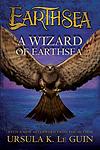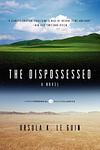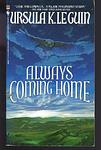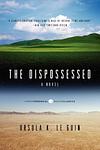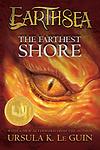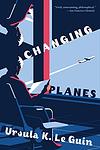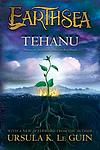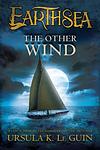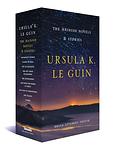Ursula K. Le Guin
Ursula K. Le Guin was an influential American author known for her works of speculative fiction, including science fiction and fantasy. Her notable works include the 'Earthsea' fantasy series, the science fiction novel 'The Left Hand of Darkness', and the dystopian novel 'The Dispossessed'. Le Guin's writing was characterized by its exploration of gender, society, and humanity's relationship with the natural world. She received numerous awards for her contributions to literature, including the Hugo, Nebula, and National Book Awards.
Books
This list of books are ONLY the books that have been ranked on the lists that are aggregated on this site. This is not a comprehensive list of all books by this author.
-
1. A Wizard of Earthsea
This fantasy novel follows the story of a young boy named Ged who lives in a world of islands called Earthsea. Ged discovers he has a natural talent for magic and is sent to a school for wizards on the island of Roke. As he grows and learns, his arrogance leads him to unleash a shadow creature that he must then spend years trying to defeat. The book explores themes of balance, power, and the danger of hubris, as Ged learns to control his abilities and accept responsibility for his actions.
-
2. The Left Hand Of Darkness
The novel is a groundbreaking work of science fiction that explores themes of gender, politics, and identity. Set on a planet called Gethen, where the inhabitants are ambisexual, shifting between male and female, the story follows an envoy from Earth who struggles to understand this alien society. As he navigates the complex political landscape of Gethen, he must also grapple with his own preconceptions about gender and sexuality. The book is a profound exploration of difference, otherness, and what it means to be human.
-
3. The Dispossessed
The novel is a profound exploration of two vastly different societies on twin planets, Urras and Anarres. The protagonist is a brilliant physicist from Anarres, a planet with an anarchist society, who travels to Urras, a planet with a capitalist and authoritarian regime. The book explores his struggle to reconcile his anarchist beliefs with the stark realities of a different socio-political system. It's a thought-provoking investigation of human nature, power structures, and the idea of utopia.
-
4. The Tombs Of Atuan
In this fantasy novel, a young girl named Tenar is taken from her home to become the high priestess of the Nameless Ones at the Tombs of Atuan, a labyrinthine and sacred underground complex. As she grows into her role, her life of solitude and ritual is disrupted by the arrival of Ged, a wizard from the archipelago of Earthsea, who seeks a lost treasure hidden within the tombs. The encounter challenges Tenar's beliefs and her allegiance to the Nameless Ones, leading her on a journey of self-discovery and liberation, as she begins to question the darkness that has defined her existence and contemplates the possibility of a life beyond the confines of the tombs.
-
5. Dancing At The Edge Of The World
"Dancing at the Edge of the World" is a thought-provoking collection of essays, talks, and reviews by a renowned speculative fiction author, which delves into a wide array of topics ranging from feminism, social responsibility, and the author's perspectives on writing and storytelling to broader reflections on humanity's place in the natural world. The book is a testament to the author's eloquence, intellectual curiosity, and profound insights into the human condition, offering readers a unique blend of literary criticism, personal narrative, and cultural commentary that challenges and inspires. Through her exploration of alternative realities and the power of imagination, the author invites readers to consider new possibilities and the transformative potential of fiction.
-
6. Always Coming Home
This novel is a combination of fiction, folklore, poetry, and anthropology set in a post-apocalyptic future in Northern California. It revolves around a tribal society known as the Kesh, who have developed a sustainable lifestyle and a rich cultural heritage after the fall of our current civilization. The narrative is interspersed with the Kesh's myths, poems, and rituals, and is primarily seen through the eyes of a woman named Stone Telling, who recounts her journey from her tribal home to a patriarchal dystopian city and back.
-
7. The Word For World Is Forest
"The Word For World Is Forest" is a thought-provoking science fiction novel that explores the consequences of human colonization and exploitation of a peaceful forest planet inhabited by the indigenous Athsheans. As the humans ruthlessly exploit the planet's resources and enslave the Athsheans, a group of Athshean rebels rise up to fight for their freedom, leading to a clash of cultures and an examination of the destructive nature of imperialism and the importance of respecting the environment and the rights of other beings.
-
8. The Farthest Shore
In this third installment of a high-fantasy series, a young prince and an archmage set out on a harrowing journey to discover the cause of a mysterious blight that is draining magic and life from their world. As they travel to the farthest reaches of their archipelago, facing dragons and confronting death itself, they must unravel a complex web of greed and power. The narrative explores profound themes such as the balance between life and death, the true cost of immortality, and the necessity of accepting one's own mortality, culminating in a quest that is as much about inner discovery as it is about saving their realm from the encroaching darkness.
-
9. The Lathe Of Heaven
In a dystopian future, George Orr possesses the unique ability to alter reality through his dreams. However, he is haunted by the consequences of his unintentional changes. Seeking help, he is referred to a psychiatrist who becomes fascinated with George's power. As they delve deeper into George's dreams, their actions have far-reaching effects, blurring the boundaries between dreams and reality. This thought-provoking novel explores the ethical implications of playing god and the delicate balance between the power of imagination and the dangers of unchecked control.
-
10. Changing Planes
This book presents a unique collection of interconnected short stories that explore a myriad of imaginative worlds accessible through the mundane act of waiting in an airport and "changing planes." The narrative serves as a metaphorical journey, inviting readers to explore diverse societies and cultures that reflect on humanity's vast potential and its flaws. Through these fantastical tales, the book delves into themes of societal norms, communication, and the essence of being, offering a reflective look at our own world by holding up a mirror to the customs, philosophies, and idiosyncrasies of the fictional ones. The stories are woven together with a keen insight into human nature, showcasing the author's prowess in speculative fiction and her ability to transport readers to worlds that are at once alien and familiar.
-
11. Tehanu: The Last Book of Earthsea
In this fantasy novel, the narrative shifts focus to a woman named Tenar, who has left behind her powerful past to live a quiet life on Gont Island. When she adopts a horribly burned girl named Therru, Tenar's life intertwines with that of the once-mighty wizard Ged, who has lost his magical powers. Together, they navigate a world where the balance of power is shifting, confronting both personal challenges and broader societal changes. The novel explores themes of gender, power, and the value of the mundane in contrast to the heroic, as it brings a new perspective to the rich tapestry of the series' universe.
-
12. The Telling
In this science fiction narrative, a woman from Earth travels to a distant planet that has recently joined an interstellar collective. Upon arrival, she discovers that the planet's unique culture, which is deeply rooted in storytelling and oral tradition, is being systematically eradicated by a repressive regime that seeks to align all societies under a homogenized set of beliefs and practices. As she becomes more immersed in the local way of life, she learns the power and significance of their stories, leading her to question the nature of truth and the importance of cultural preservation in the face of authoritarian control. Through her journey, the novel explores themes of memory, resistance, and the intricate relationship between language and identity.
-
13. The Other Wind
In this fantasy novel, the last in its series, the narrative follows a former goatherd who has become a powerful mage, as he grapples with troubling dreams of the dead calling to the living. The story explores themes of mortality, the afterlife, and the need for cultural and spiritual reconciliation. As the mage and a cast of diverse characters, including a dragon, a young woman with half-dragon heritage, and a disenchanted princess, embark on a quest to heal the breach between the worlds of the living and the dead, they confront ancient wrongs and seek to restore the balance of magic in their world. The novel delves into the consequences of past actions and the importance of understanding and respecting the natural order.
-
14. The Hainish Novels And Stories
This collection brings together the seminal works set in the Hainish Universe, a speculative fiction series that explores complex themes of sociology, anthropology, and psychology within a richly imagined interstellar setting. Through a variety of planets and cultures, the series delves into the intricacies of human nature, the concept of gender, and the consequences of technological and social evolution. The narratives, while diverse in their storytelling, are unified by their exploration of the potential paths of human development and the interconnectedness of all life across the cosmos, challenging readers to reconsider their perspectives on society, identity, and the environment.
-
15. Powers
"Powers" is the final installment in a young adult fantasy series set in a world where some individuals possess magical abilities. The story follows a young slave with an extraordinary memory who escapes his life of servitude and embarks on a journey of self-discovery. Along the way, he encounters various cultures and belief systems, which challenge his understanding of freedom, power, and the nature of his own abilities. As he navigates political intrigue and personal challenges, he must come to terms with his past and decide what kind of future he wants to create for himself and others.
